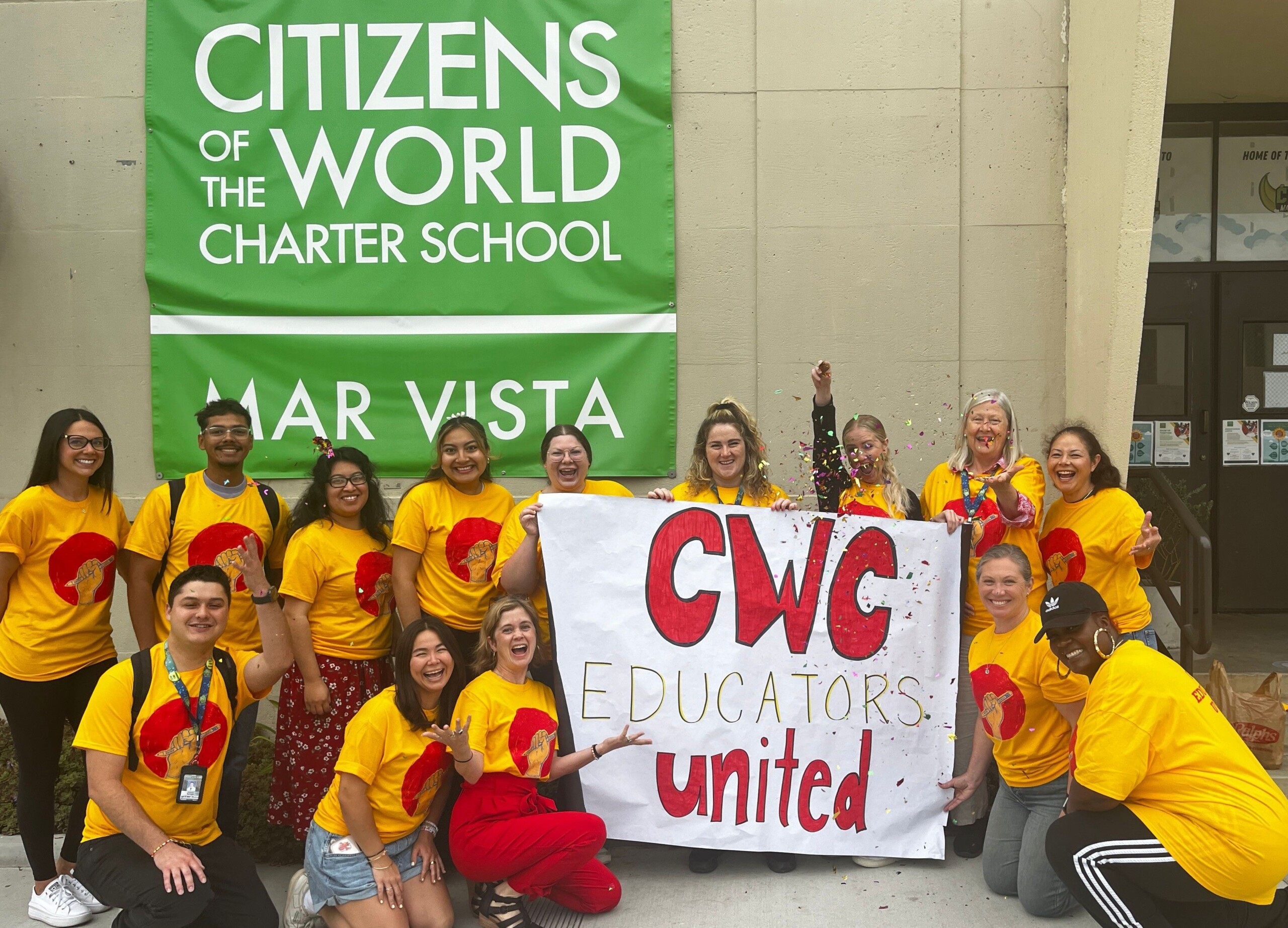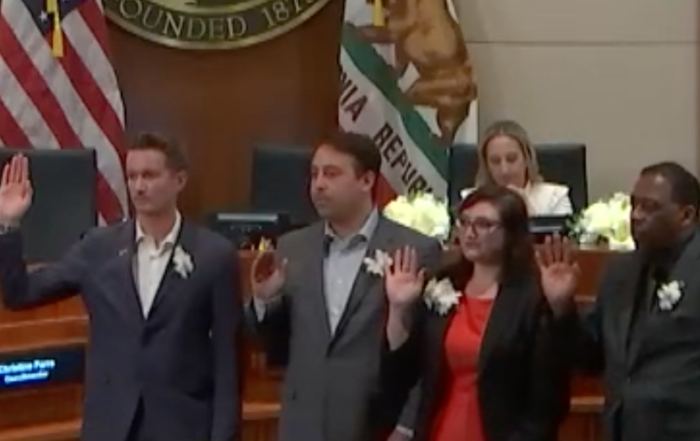Leslie Libaw comes from a union family. Her parents were educators and union members. Her father was so devoted to his union that he always carried his contract in his pants pocket. Libaw has been pro-union for her entire life but has worked at a non-union school, Citizens of the World Charter Schools (CWC LA), Mar Vista, for almost a decade. That changed last week when more than 90 percent of CWC educators voted to unionize with United Teachers Los Angeles (UTLA).
CWC LA employs around 170 educators at seven campuses across Los Angeles. Their new union, CWC Educators United, was formed to give educators the means to negotiate with management and improve teaching and learning conditions. CWC Educators United said their union “Seeks to amplify family and educators’ voices in the decision-making processes, ensure a collaborative approach to improve learning and working conditions, and underscore their commitment to diversity, transparency, and community collaboration.”
Educators at CWC Mar Vista and CWC Hollywood spoke to Westside Voice about the union effort.
CWC LA was founded in 2010 at the peak of the charter boom in Los Angeles. Under a pro-charter majority LAUSD Board of Education and a series of pro-charter superintendents, the number of charters increased from 58 to 220 from 2005 to 2016. The proliferation of charters has since slowed. Today, 272 charter schools are operating in the district that enroll a combined 150,000 students. In the years since its founding, CWC LA opened five schools across seven campuses, enrolling around 3,700 students between them.
Charter schools, even those affiliated with public school districts, are exempt from following large sections of the California Education Code. Charter schools are not, for example, required to have collective bargaining agreements with their public employees. In LAUSD, UTLA and charter advocacy groups have been at odds over the privatization of the district. Proponents of charter schools are by and large vocally anti-union and consider the specter of charter teachers unionizing an existential threat.
As of 2017, only 11 percent of charter schools had unionized staff. In 2019, unionized charter teachers went on strike for the first time in history in Chicago. Los Angeles charter teachers with Accelerated Schools also went on strike in 2019 for the second time in history. Though scholarship on charter unions is sparse, the studies that do exist reveal that charter teachers organize for the same reason other public school teachers do: better conditions in schools lead to better student outcomes.
A study from 2019 concluded that teaching unions “Are almost universally found to be positive for student performance.”
At CWC LA, educators say their union is crucial to keeping the organization healthy and sustainable.
One of CWC LA’s objectives is to be “Diverse by design” – to have their student body be representative of “Their surrounding communities and the larger society in terms of race, ethnicity, socioeconomic status, and all other forms of diversity, both seen and unseen.” The organization’s commitment to Diversity, Equity, Inclusion, and Belonging (DEIB) attracts educators who share the same values.
It was a large draw for Leslie Libaw when she joined CWC nine years ago. With over 20 years in education, Libaw sees her union as congruent and complementary to CWC’s core values. “There’s not a lot that’s more DEIB than a union,” Libaw said. Educators say the unionization effort will bring CWC into a better alignment with its stated mission. “We joined the school because of our commitment to our core values and our commitment to DEIB. We’re unionizing and organizing this institution for the benefit of our students.”
Julia Hiser, a math interventionist at CWC Hollywood, has been with CWC for 10 years. “Our charter school has an amazing mission and core values. As educators, we want to preserve what we love about our schools and bring about positive changes that put students first,” Hiser said.
Teachers’ voices were not well integrated structurally, CWC educators said. Teachers tried to advocate for themselves and their students but found that the organization’s top-down structure prevented them from meaningfully changing conditions at the schools. “Having a union is a great way to adjust that so that there’s a stronger input of teacher voices making decisions across the organization,” Libaw said.
Libaw teaches special education at CWC Mar Vista. At her school, classes are fully inclusive – students with special needs are taught in the same classrooms as general education students. Libaw said the system is beneficial for all of the students at her school, but the inclusive structure requires more support for the high-level needs of these classrooms – lower class sizes, more teaching assistants, and more professional training.
“Every year that I’ve worked at this school they’ve raised class sizes and lowered additional teaching support,” Libaw said.
CWC reported that on average, their student-to-teacher ratio is smaller than LAUSD and other nearby districts. In 2017-2018, the most recent year with data available, CWC Mar Vista and CWC Hollywood had higher pupil-to-teacher ratios than other LAUSD schools.
Hiser said arts funding and teacher retention were also pieces of their collective decision to unionize. “As we advocate for our working conditions, at the end of the day, it’s about the students in front of us and all of those who have yet to come through our doors.”
Sarah Slater teaches transitional kindergarten at CWC Mar Vista. “Teachers have a firsthand experience of what our students need, we see it everyday in the classroom,” she said. The union will give educators the ability to advocate collectively for students.
“When our expertise and our voices are central to decision-making, our students benefit,” Hiser said.
Slater added that support for the union extended beyond the classroom. Parents she’d spoken to in recent days were “Supportive and very happy for all of the teachers. They want what’s best for us because they know that’s what’s best for the students and the school as a whole.”
CWC educators won their union vote by a supermajority – 90 percent voted yes. “I think that really shows just how ready we are to have a seat at the table,” Hiser said.
Solidarity between the educators remained steady throughout the years of organizing. Libaw said CWC management was unaware that educators were organizing to join a union until they announced their vote last week. Educators have been organizing since before 2020, when Libaw first heard about it. Union efforts typically become known to employers at some point in the process, usually well before the union vote. That their union effort was kept under wraps for so long, Libaw said, demonstrates how much respect exists among the teachers. Even the teachers who voted no didn’t mention the unionization effort to management.
In the week since CWC Educators United announced their union vote, CWC administrators haven’t communicated much about it to educators.
According to the California Teachers Association (CTA) charter educators unionize to “Advocate for a stronger voice in important decisions, to support initiatives that lower teacher turnover, and to build the stable school communities their students deserve.”
But the union vote is sometimes just the beginning of educators’ struggle for recognition.
Alliance College-Ready Public Schools was the most recent charter to organize with UTLA in 2019. In the five years since their vote to join the union, Alliance Educators United has fought to get their union recognized by Alliance management. Alliance was ordered multiple times by the California Public Employment Relations Board to stop its anti-union activity. According to UTLA, management pursued a “Strategy of legal delay, wasting millions to prevent the execution of repeated legal orders to bargain.” This year, Alliance management joined negotiations with the union for the first time.
“Some charter management operators are notorious union busters, using any means necessary to scare, obstruct, or otherwise prevent their educators from organizing a union,” CTA said.
CWC Educators United are hopeful that their employer will come to the table and recognize the union.
“One of our core values [at CWC] is the value of change – we embrace the unexpected and new,” Libaw said. “For administrators, this unionization process is both unexpected and new. I imagine that they will wholeheartedly embrace this change.”
“We’re looking forward to working together and having a collaborative relationship,” Hiser said.
A spokesperson from Citizens of the World Charter Schools Los Angeles told Westside Voice in a statement:
“At CWC LA, we are guided by our mission and vision to provide a diverse-by-design learning environment with strong academics and socio-emotional learning to grow students into true citizens of the world. We are proud to have done this for more than a decade through close partnership and collaboration with our team of passionate and talented educators. We respect the rights of our staff to pursue this process and want to ensure that the voices of our entire community continue to be heard. We are all deeply committed to our core purpose of providing quality education to our community and are committed to a process that maintains the key components that make CWC LA so special.”
UTLA represents over 900 educators at LAUSD charter schools. UTLA represents 38,000 educators in total. The union has questioned charter policies and called for more transparency and accountability from charter management. There’s no confusion in their union on where UTLA stands with charter teachers. “UTLA is pro-educator and always has been,” Hiser said.
Photo courtesy of UTLA.
Stay informed. Sign up for The Westside Voice Newsletter
By clicking submit, you agree to share your email address with Westside Voice. We do not sell or share your information with anyone.








